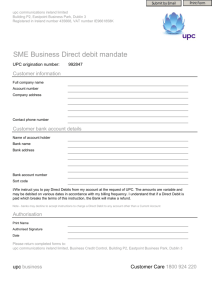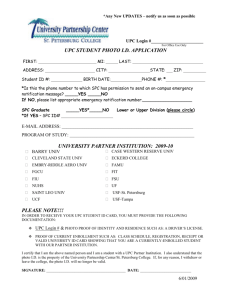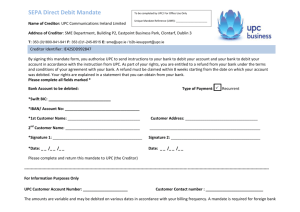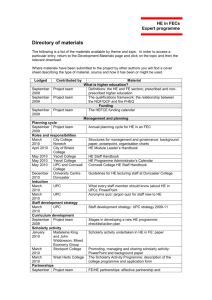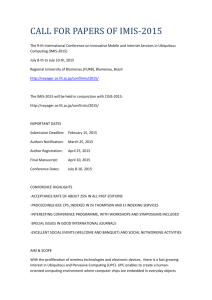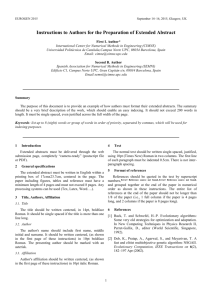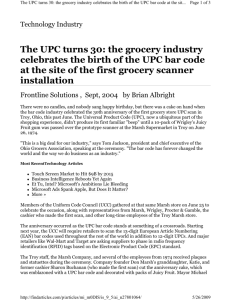UPC Ireland - Department of Jobs, Enterprise and Innovation
advertisement
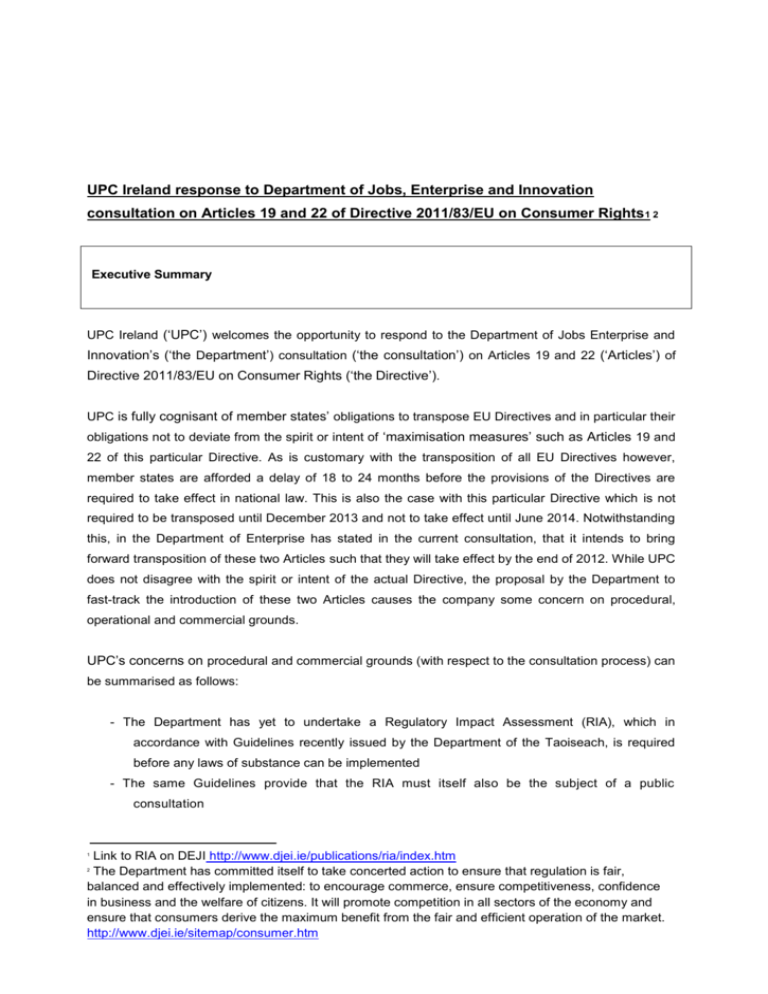
UPC Ireland response to Department of Jobs, Enterprise and Innovation consultation on Articles 19 and 22 of Directive 2011/83/EU on Consumer Rights 1 2 Executive Summary UPC Ireland (‘UPC’) welcomes the opportunity to respond to the Department of Jobs Enterprise and Innovation’s (‘the Department’) consultation (‘the consultation’) on Articles 19 and 22 (‘Articles’) of Directive 2011/83/EU on Consumer Rights (‘the Directive’). UPC is fully cognisant of member states’ obligations to transpose EU Directives and in particular their obligations not to deviate from the spirit or intent of ‘maximisation measures’ such as Articles 19 and 22 of this particular Directive. As is customary with the transposition of all EU Directives however, member states are afforded a delay of 18 to 24 months before the provisions of the Directives are required to take effect in national law. This is also the case with this particular Directive which is not required to be transposed until December 2013 and not to take effect until June 2014. Notwithstanding this, in the Department of Enterprise has stated in the current consultation, that it intends to bring forward transposition of these two Articles such that they will take effect by the end of 2012. While UPC does not disagree with the spirit or intent of the actual Directive, the proposal by the Department to fast-track the introduction of these two Articles causes the company some concern on procedural, operational and commercial grounds. UPC’s concerns on procedural and commercial grounds (with respect to the consultation process) can be summarised as follows: - The Department has yet to undertake a Regulatory Impact Assessment (RIA), which in accordance with Guidelines recently issued by the Department of the Taoiseach, is required before any laws of substance can be implemented - The same Guidelines provide that the RIA must itself also be the subject of a public consultation Link to RIA on DEJI http://www.djei.ie/publications/ria/index.htm The Department has committed itself to take concerted action to ensure that regulation is fair, balanced and effectively implemented: to encourage commerce, ensure competitiveness, confidence in business and the welfare of citizens. It will promote competition in all sectors of the economy and ensure that consumers derive the maximum benefit from the fair and efficient operation of the market. http://www.djei.ie/sitemap/consumer.htm 1 2 . - While the Department in subsequent correspondence to the industry confirmed it intends to undertake a RIA, there is no information as to when this will happen, whether it will be the subject of public consultation and also, if it will be undertaken in advance of the Articles taking effect (by the end of 2012) - The Department proposes to grant criminal and civil powers of enforcement to the National Consumer Agency (NCA) – an agency which is currently without a CEO and is to be amalgamated by the Competition Authority in the near future - That the Department is conferring such powers on a Government body that has somewhat of an uncertain future, is of concern - Further the consultation does not provide clear insights as to whether and if trader can expect the NCA to issue guidelines that will give direction on how traders might ensure compliance - Such guidelines are necessary to provide clarity to traders as to what costs can be legitimately attributed to methods of payment - Without such guidance, there is the risk of differences in interpretation which risk inconsistencies in compliance. This will only create uncertainty and potentially competitive disadvantage. - Finally, the absence of clear guidelines will result in the NCA deciding on a case -by-case basis whether traders are in compliance. This form of bi-lateral engagement will not in the best interests of ensuring consistent and transparent application of measures acr oss all industries. From an operational standpoint, UPC has a number of concerns: - The Department has not put forward credible or sufficient evidence justifying why the these two provisions should be brought in prior to the other provisions of the Directive or indeed why this has to happen by the end of 2012 - The publication of the consultation paper does not in of itself constitute adequate notice to traders – particularly since the timing with respect to the introduction of these Articles is unclear (i.e. whether they will indeed take effect in national law in the coming two months; or whether the Department will consider a stay in their enforcement) - Of paramount concern is the fact that the Department has not given due consideration to the operational impact on traders and whether they would even be in a position to ensure compliance by the proposed timeline - In UPC’s instance, the time required for the company to firstly undertake a review of its payment methods and any fees associated with these methods and then make adjustments (if any) to its financial, billing and IT systems would mean the company would require at a minimum, six months from the date of enactment of the provisions - Further, it should be noted that ComReg is the regulatory authority of import for all telecommunications providers and it has strict consumer notification requirements that have to be adhered to where there is a change to consumer’s product price. These require that consumers have to be notified on an individual basis and one month in advance of any change taking effect (regardless if the change is to the consumer’s benefit). This one month notification would have to be included in the planning for any operational changes that might occur further to a review of compliance with these provisions. In summary, while UPC does not contest the introduction of this Directive or its provisio ns, it would strongly argue in favour of the need for the Department to undertake a RIA which will ensure the Department and NCA have a clear understanding of the operational and commercial impact of transposing these Articles in the coming months. This will enable the Department to develop an informed view as to when it would be reasonable and practicable to require traders to be in compliance and also ensure they are complied with in a timely and consistent manner by all concerned. From UPC’s perspective, any changes to the company’s IT infrastructure, it would require a minimum of six months from the date of enactment in order to make changes – if any – to the company systems. Section B: Overview of UPC consumer operations Overview of UPC’s consumer business UPC is Ireland’s leading triple play provider offering over 969,000 TV, internet and phone services to over 538,000 unique customers who, depending on the customer and product profile, pay for their service on a monthly, bi-monthly, quarterly or yearly basis. In all, the company processes over 4 million (payment) transactions on a yearly basis. ----------------------------------------------------------------------------------------------------------------------------------------------------------------------------------------------------------------------------------------------------------------------- ------------------------------------------------------------------------------------------------------------------------------------------------------------------------------------------------------------------------------------------------------------------------------------ -------------------------------------------------- The methods of payment on offer by UPC Unlike some of its key competitors, UPC offers an extensive range of payment methods to its customers. This means UPC customers have considerable choice in selecting the payment method that best suits their needs. All customers are informed at point of sale of any terms and conditions associated with a particular method of payment. Of note and in contrast to some telecommunications and utility providers, UPC does not require customers to pay a security deposit regardless of the method of payment chosen. UPC accepts bill payments by Direct Debit (DD), credit or laser card, UPC Payment Card, via Giro, cheque or cash. Customers can settle their bill over the phone speaking to a customer agent or by the automated phone system, online or at any Bank , Post Office, Payzone or Paypoint outlet. --------------------------------------------------------------------------------------------------------------------------------------------- ----------------------------------------------------------------------------------------------------------------------- Notwithstanding the considerable range of payment options on offer, UPC, like any commercial entity, has for operational and commercial reasons, preferred methods of payment . In UPC’s case, the preferred method of payment is Direct Debit (also known as ‘Autopay’ by UPC customers). --------------------------------------------------------------------------------------------------------------------------------------4 Data in this section relating to bills and percentages for payment methods is valid up to mid-October 2012 Direct Debit From a company standpoint, the benefits of customers choosing to pay by Direct Debit (DD) are clear; it helps manage cash flow, payment dates and maintain a lower bad debt profile. From a customer standpoint, DD offers convenience and ensures that bills are paid on time and are not liable to late administration fees or service interruptions. Given the costs efficiencies associated with using DD, UPC has historically rewarded customers that pay by this method by not applying the 3 .75€ payment administration fee to their bills. UPC is delighted to read in the Department’s consultation paper that the European Commission has confirmed to the Irish Government that this is an acceptable practice and given this, the Department intends to repeal Sections 48 and 49 of the Consumer Protection Act 2007 which previously sought to outlaw this practice. Separately, UPC welcomes the confirmation from both the European Commission and the Department that the practice of offering such discounts to those that pay by DD is not in scope for the purposes of this consultation. That almost ----- of UPC’s customer base now pays their bills by DD is testament to the popularity of this method of payment and UPC welcomes the Department’s new found support for this model. For customers that do not have a bank account (and therefore unable to pay by DD), the company introduced a UPC Payment Card which allows customers pay their bill at any Payzone or Paypoint location in the country. Payzone alone has over 1185 locations across the country that are typically open from 8am through to 10pm, seven days a week which provides UPC customers with considerable ease of access and convenience to pay their bills. ---------------------------------------------------------------------------------------------------------------------------------------- Customers that pay by Direct Debit, the UPC Payment card or any transactions paid in Paypoint or Payzone outlets are not charged the 3.75€ UPC payment administration fee. Rationale behind promotion of certain methods of payment The consultation paper does not attempt to provide insights or justification as to why traders may have preferred methods of payment. This may be due to a lack of understanding of the impact payment methods can have on the commercial and financial operations of a trading business. This is particularly true in relation to the Section on ‘Price Rebates for Payment by Direct Debit’, where the Department lists operational efficiencies and costs savings as being the primary drivers behind companies promoting DD over other methods of payment. This however totally ignores the role bad debt can play in a trader’s preference for DD. In UPC’s case, the bad debt ratio can vary considerably between one method of payment and another e.g. the bad debt for customers that pay by An Post is considerably higher than those that pay by DD. The need for the company therefore to manage its bad debt profile is the primary driver behind UPC’s preference that customers pay by DD. The time and labour costs associated with the collection of monies owed cannot be under estimated. By way of example, UPC has a staff of ------------- full time employees that are employed in its credit management department whose primary objective is to manage the company’s bad debt. ------------------------------------------------------------------------------------------------------------------------------------------------------------------------------------------------------------------------------------------------------------------------------------ It should also be noted that costs associated in management of bad debt is not just limited to the pursuance of non-payment of bills. In instances where a customer has given a company fraudulent bank account or card information, it is UPC that incurs penalty charges associated with any payments that may bounce as a result. --------------------------------------------------------------------------------------------- ------------------------------------- While it may be true that use of fraudulent details is not the norm, it is more prevalent than one might think, is on the rise and is an issue that has a direct operational and financial impact on legitimate enterprises. Transposition of Articles 19 and 22 of Directive 2011/83/EU UPC understands the Irish Government has an obligation to transpose Directive 2011/83/EU (‘the Directive’) and the Department has decided to bring forward the transposition date for Articles 19 and 22 to take effect in Irish law by the end of 2012. Article 19 relates to charges traders may apply in association with certain methods of payment whereas Article 22 touches on the proposed enforcement obligations that will reside with the National Consumer Agency (NCA) which will be the body to oversee compliance with Article 19. The focus of Article 19 is to “ensure that payment charges are not used as an additional source of revenue but reflect instead the real cost of payment instruments to the trader”5 and it is the Department’s intention to provide in the Regulations that will give effect to Article 19 “that a charge to consumers, however described, that is avoidable where a specified payment instrument is used shall 6 be regarded as a fee for the use of a means of payment for the purposes of the Regulations”. While UPC does not take issue with the original spirit or intent of provisions in Article 19, if the Department transposes Article 19 along the lines proposed, it may have unintended consequences on pricing for the application of discounts for certain methods of payment. Put simply, UPC currently applies a 3.75€ per bill discount to any customer that chooses to pay by DD. The difference in price that is charged to customers paying by any other means does not nor should not equate to a fee. 5 6 Page 3 of the consultation paper Page 5 of the consultation paper Lack of a Regulatory Impact Assessment (RIA) Directive 2011/83/EU on Consumer Rights (‘the Directive’) was adopted on October 25, 2011. In accordance with regulatory best practice and normal EU legislative procedures, a Regulatory Impact Assessment (RIA) was issued for consultation alongside the earlier drafts of that Directive. As the Department is aware, Article 19 was introduced in the final stages of the EU negotiations and therefore was never considered as part of the EU’s RIA. UPC therefore welcomes the recent confirmation from the Department that it intends to conduct an RIA in advance of the enactment of Articles 19 and 22 and responses to from this present consultation will input into that RIA. 7 The importance of conducting a RIA in advance of implementation of policy initiatives is well documented. Indeed, the Department of the Taoiseach in its own Revised RIA Guidelines (‘the Guidelines’) has stipulated that the undertaking of a RIA is a necessary and useful step “to improve the quality of political and administrative decision making” that can also help “identify possible side effects or hidden costs in associated with regulatory [compliance] and quantify the likely costs of compliance...”.8 As the Department will be aware the Guidelines also provide that matters in relation to 9 enforcement and compliance should also be covered in the RIA , so presumably provisions with respect to Article 22 will also be addressed in the Department’s RIA. Finally and to note, the Guidelines also indicate that the RIA should be used as a basis for consultation and in this regard UPC would enquire as to the Department’s intentions with respect to engaging with relevant stakeholders on the RIA itself. 10 UPC’s concerns As previously stated, UPC does not take issue with the sentiment nor should it be understood that UPC is making the case for traders to generate revenue on the back of fees associated with certain methods of payment. UPC’s primary concern relates to the proposed timing of the introduction of these provisions which suggests these provisions could take effect within the forthcoming forty-five days. Secondary to this, but no less important, is a real concern the company has that these provisions could be enacted without industry engagement on a RIA or advance guidance from the NCA as to how traders will be expected to comply. This will mean that traders such as UPC will be unclear on matters such as what costs can be considered as legitimate for inclusion in fees that are applied to consumers. Letter from Mr. John Murphy, Secretary General of the Department of Jobs Enterprise and Innovation to TIF, October 10, 2012 “Revised RIA Guidelines: How to conduct a Regulatory Impact Assessment”, Department of the Taoiseach, June 2009. Page 3 Idem Page 32- 33 Idem Page 5 7 8 9 10 On this note, while it may very well be the Department’s intention that these Articles would not produce administrative or other burdens on business, the reality is that the introduction of these provisions, in the timeframe proposed, without clear guidance as to how companies will be expected to comply, will cause considerable burden and confusion for businesses. From UPC’s perspective, in order for the company to satisfy itself that it would be in compliance with the provisions that are eventually adopted, the following steps would have to be undertaken: - 4 weeks at minimum to complete a review of all customer product price plans - 8 weeks to undertake any required systems changes - 30 days advance notification to customers informing them of changes to their fee structure (as required by ComReg). UPC has four bill cycles a month, which means customers are issued their bills on a rolling schedule therefore customers receive notifications over a staggered period of time. - 8 weeks to get these changes through the various bill cycles which as indicated earlier in the paper, UPC issues bills on a monthly, bi-monthly, quarterly, half yearly and yearly basis. - Change Freeze: UPC like many other telecommunications providers undertakes a systems change freeze over the Christmas holiday period. This means that no changes can be introduced to the company’s billing or IT systems during that time. UPC’s change free process runs from December 15 to January 7, 2013. Given the above, UPC would strongly advocate against the immediate introduction of the proposals and would in any event require a minimum of a six month delay from the time of enactment of these provisions. This will allow the company the required time to review its pricing plans, make any adjustments (if necessary) and communicate to its customer base. UPC would therefore respectfully request the Department of Enterprise in its consideration of this consultation paper and separately, in the context of its proposed RIA, to take the above requirements into account and ensure that traders are afforded sufficient time to comply with the provisions of the Articles. From a UPC standpoint, the company would require at minimum six months to make any adjustments that may be ultimately required. Section C: Responses to questions in the consultation paper UPC does not have any opinion on several of the consultation questions. These responses should be read in conjunction with the general commentary provided by UPC in the adjoining Executive Summary and Section B above. 1. Are you aware of direct payment charges applied to consumer transactions by traders other than those listed in Box 1? If so, please give details. UPC has no view on this question. 2. Are you aware of administration, service, booking or handling charges in the passenger transport or other sectors (other than those referred to in paragraph 28) that are avoidable by the use of a specified method of payment? If so, please give details? UPC has no view on this question. 3. Should a provision along the lines proposed in paragraph 36 be included in the Regulations to give effect to Article 19 in order to encompass the payment-related charges applied by some airlines and ferry companies? If not, why not? UPC has no view on this question. 4. Should consideration be given to adopting a provision similar to Article 23(1) of the Air Services Regulation for sea carriers and/or other sectors. If so, which other sectors should be covered? If the provision should not be extended in this way, why not? UPC has no view on this question. 5. Are you aware of administration, service, booking, or handling charges not avoidable by the use of a specified payment method (other than those referred to in paragraphs 41-43) that apply to event tickets or in other sectors? If so, please give details. There are a range of costs associated with offering certain payment methods. --------------------------------------------------------------------------------------------------------------------------------------------------------------------------------------------------------------------------------------------------------------------------------------------------------- ------------------------------------------------------------------------------------------------------------------------------------------ --------- Page 9 of 12 ------------------------------------------------------------------------------------------------------------------------------------------------------------------------------------------- 6. Should a provision along the lines proposed in paragraph 46 be included in the Regulations to give effect to Article 19 in order to encompass the charges applicable to tickets for entertainment and other events? If not, why not? UPC has no particular view on this section other than to advocate that the provisions of Articles 19 and 22 should be applied in a consistent manner across all commercial sectors. 7. Are the figures on the costs of payment to traders cited in paragraphs 57 and 60 broadly accurate? Information on these costs would be welcomed in responses to this consultation and will be treated in confidence. UPC has no particular view on this question. 8. Do you agree that only costs arising directly from the use of a given means of payment should be taken into account in determining the ‘cost borne by the trader’ for the purposes of Article 19. If not, what other costs should be taken into account in your view? UPC believes the NCA should provider traders with explicit guidance as to costs traders can legitimately attribute as being costs associated with particular payment methods. This will ensure consistency of application of the provisions of the Articles and therefore a level playing field for all commercial traders. 9. Are you aware of cases where traders seek extra payment in addition to the payment agreed for their main contractual obligation without seeking the consumer’s express consent? If so, please give details. UPC has no view on this question. 10. Are you aware of cases where traders use default payment options, such as pre-ticked boxes, which the consumer is required to reject in order to avoid having to make a payment in addition to that agreed for the main contractual obligation? If so, please give details. UPC has no particular view on this question. 11. Should Article 19 and/or Article 22 be applied to all of the sectors excluded from the scope of the Consumer Rights Directive other than financial services? If not, why not? UPC has no particular view on this question. 12. Should off-premises transactions below €50 be subject to Articles 19 and 22. If not, why not? UPC has no view on this question. 13. Should Article 19 and/or Article 22 be subject to both criminal and civil enforcement? If not, why not? UPC would view criminal enforcement to be excessive. UPC would suggest the potential for civil enforcement in extreme cases and as a last resort should the trader/company fail to follow the initial guidance of the National Consumer Agency. This civil prosecution could mirror that set out in the Consumer Protection Act 2007 which allows the individual to apply to the Courts for an order prohibiting a trader or person from engaging in a defined prohibited act or practice rather than issuing a large financial penalty. 14. Should the National Consumer Agency be empowered to apply for prohibition orders in respect of breaches of Articles 19 and 22 in the District Court as well as the Circuit Court? If not, why not? UPC would recommend the District Court having jurisdiction with appeals to the Circuit Court. 15. Should consumers be given a private right of redress for payment charges in breach of Article 19 and additional payments in breach of Article 22. If not, why not? UPC would recommend that consumers be given the right to raise their complaint initially with the NCA. Should the NCA deem there is a case to be answered then UPC would advocate that NCA notifies the trader and carries out an investigation into the alleged reported issue. This is similar to the process set out in the Data Protection Acts 1986-2003 and would suggest that the same process be followed. This would allow the consumer to report their grievances but also prevent spurious and unfounded claims being head by the courts. 16. Should a reversal of the burden of proof along the lines proposed in paragraphs 81-82 apply in civil and criminal proceedings involving breaches of Articles 19 and 22? If not, why not? UPC does not support the notion that the burden of proof should be placed on the trader. UPC would recommend that the onus of proof should be placed on the consumer. The consumer should be expected to provide documentation showing that the payment requested is an addition to the payment rate agreed between the consumer and the trader/company. UPC, November 2012 Page 12 of 12
